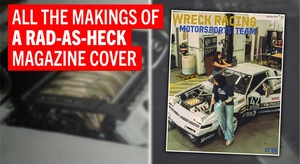
The cause of our VW GTI’s rough idle and intermittent check engine light? Our suspicions were confirmed when we opened the hood and removed the intake manifold: The intake vales were covered in gunk–an issue common on many modern VWs and direct injection vehicles.
The solution? Walnut blasting.
Watch the video to learn more about what walnut blasting is, how …
Read the rest of the story
I DIY'd this on my 2009 MINI at 50K miles, as it was recommended by the dealer......mine were gunked up but it didn't seem to bother it - no rough idle or codes popped up.
I just pulled the intake again at 112K and - clean as a pin! Guess I'll check it again at 160K. It sure needed it at 50K tho......
The walnut shells did a great job, cleaned it up and looked like new when done.
I'd like to have this done to the Expedition. It has a rough idle when cold. Not brave enough to DIY it, and I can't find anyone local that does it.
Do NOT blast an intake manifold with aluminum oxide material - especially on a turbo engine. Your rings won't outlast your oil change.

Dootz
Reader
4/9/24 1:04 a.m.
In reply to Tom_Spangler (Forum Supporter) :
I would start with throttle body cleaning first. Cheaper and easier to rule out first
So sweet of the local squirrels to do that for me under the hood of my BMW
I'm going to fix mine with some wet nitrous...

buzzboy
UltraDork
4/9/24 11:02 a.m.
I think understand the root cause of the problem, but why don't we hear about this for direct injection diesels?
I'm hoping I can put this off until I have everything I need for an MPI retrofit on my Alltrack. It'd be nice to only have to do this once over the life of the car.

xeonoex
New Reader
4/9/24 12:41 p.m.
Anyone know how much of a difference having dual injection makes? I have an RS3 which I believe does both direct and port injection. Port injection is supposed to help keep the valves cleaner. I'm not sure what extent though.
I've also heard that running your car hard and getting it hot helps prevent or break down carbon build up, but that definitely seems false now, haha.
In reply to xeonoex :
PF-DI should not have the same problem- back in the 80's and 90's, intake system deposits were still a problem, but everyone pleaded with the EPA to force fuel suppliers to have a strong minimum of detergents in them.
buzzboy said:
I think understand the root cause of the problem, but why don't we hear about this for direct injection diesels?
This is a guess- but since diesel doesn't have the same degree of PCV issues as gas does (not much diesel makes it down into the oil compared to gas), I don't think they have the same kind of flow in the system.
Running it hard and getting the engine hot does nothing for the intake valves and intake tract.......having direct and port injection seems to do the trick tho....I'm pretty sure that's what Toyota does.
In reply to MiniDave :
FWIW, intake system deposits are not the reason why PFI was added to DI. That just happened to be a benefit of doing it. Power and then emissions were the reasons.
alfadriver said:
buzzboy said:
I think understand the root cause of the problem, but why don't we hear about this for direct injection diesels?
This is a guess- but since diesel doesn't have the same degree of PCV issues as gas does (not much diesel makes it down into the oil compared to gas), I don't think they have the same kind of flow in the system.
Hmm. They do soot up the oil to a ridiculous degree, but the heavily stratified charge probably keeps much actual raw fuel from getting into the oil.
The early EGR systems were horrible for carbon, though, which is when we really started to see issues there. The 1.9 TDIs would get so much carbon in the intake manifold that you couldn't get a finger in them. I've scraped out enough carbon from one to completely fill a 24oz coffee cup, and they are small manifolds, just a tiny plenum stuck to the head.
In reply to Pete. (l33t FS) :
So a better answer is that diesels are not as popular, so you just don't hear about it?
My dad and I were discussing the whole direct injection causing deposits on the valves thing recently. One of the things he remembered reading is this article on Consumer Reports about the brand of gasoline you run in the car. I would normally be inclined to call fuel cleaners akin to snake oil but recent reading (Other articles) makes me think it's a real and worthwhile thing.
https://www.consumerreports.org/cars/fuel-economy-efficiency/top-tier-gasoline-worth-the-extra-price-a7682471234/
In reply to Msterbee :
We’ve referenced that test as well, and Zach from Sunoco reports that it holds water.
But, in a direct injected engine, the fuel doesn’t wash the backs of the valves.
More about that here: How to clean intake deposits in direct-injection engines.
Since the diesels don't have intake manifold vacuum, PCV systems are usually different. Now the EGR does soot up the intakes far worse than the DI valve issues. Trying to combat this, Chevy put the EGR on the 3.0L inline 6 Diesel after the particulate filter, to lessen the soot buildup.







































